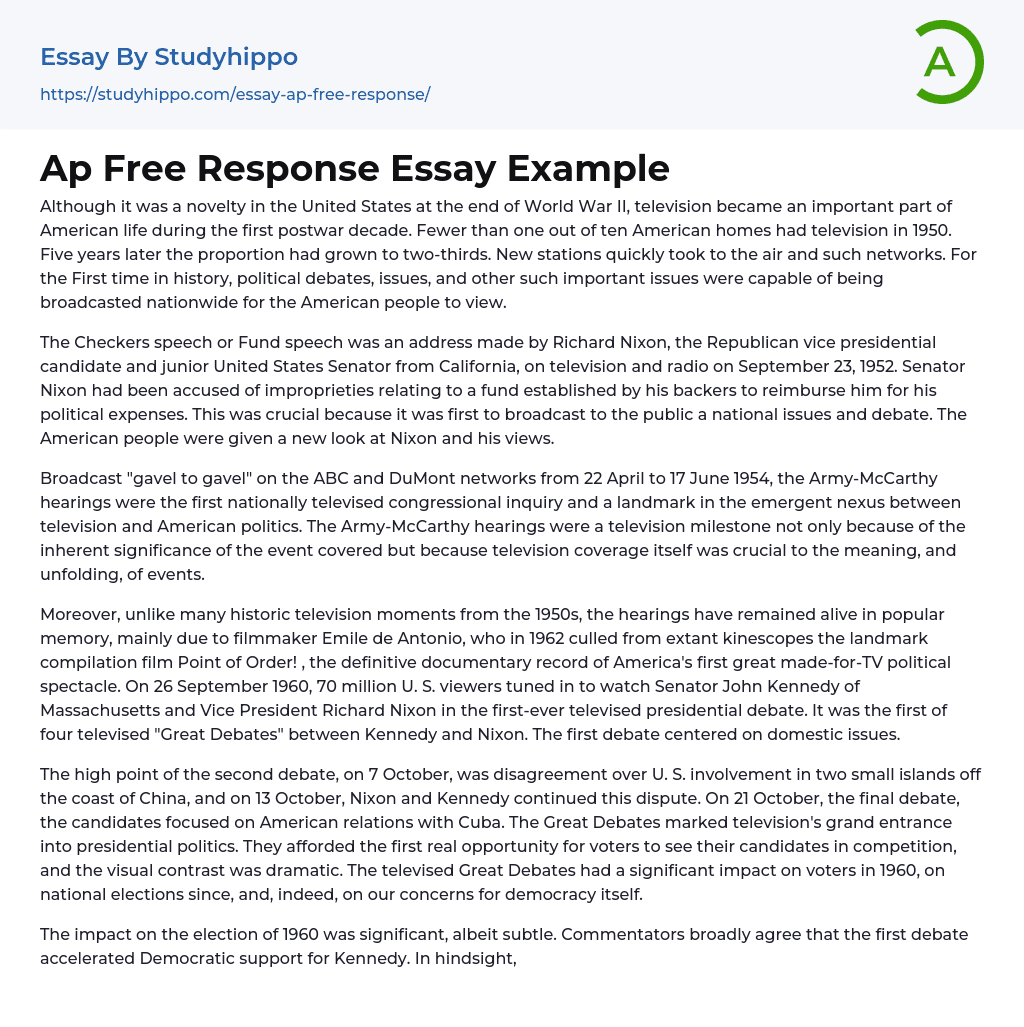Although it was a novelty in the United States at the end of World War II, television became an important part of American life during the first postwar decade. Fewer than one out of ten American homes had television in 1950. Five years later the proportion had grown to two-thirds. New stations quickly took to the air and such networks. For the First time in history, political debates, issues, and other such important issues were capable of being broadcasted nationwide for the American people to view.
The Checkers speech or Fund speech was an address made by Richard Nixon, the Republican vice presidential candidate and junior United States Senator from California, on television and radio on September 23, 1952. Senator Nixon had been accused of improprieties relating to a fund established by his backers to reimburse him for
...his political expenses. This was crucial because it was first to broadcast to the public a national issues and debate. The American people were given a new look at Nixon and his views.
Broadcast "gavel to gavel" on the ABC and DuMont networks from 22 April to 17 June 1954, the Army-McCarthy hearings were the first nationally televised congressional inquiry and a landmark in the emergent nexus between television and American politics. The Army-McCarthy hearings were a television milestone not only because of the inherent significance of the event covered but because television coverage itself was crucial to the meaning, and unfolding, of events.
Moreover, unlike many historic television moments from the 1950s, the hearings have remained alive in popular memory, mainly due to filmmaker Emile de Antonio, who in 1962 culle
from extant kinescopes the landmark compilation film Point of Order! , the definitive documentary record of America's first great made-for-TV political spectacle. On 26 September 1960, 70 million U. S. viewers tuned in to watch Senator John Kennedy of Massachusetts and Vice President Richard Nixon in the first-ever televised presidential debate. It was the first of four televised "Great Debates" between Kennedy and Nixon. The first debate centered on domestic issues.
The high point of the second debate, on 7 October, was disagreement over U. S. involvement in two small islands off the coast of China, and on 13 October, Nixon and Kennedy continued this dispute. On 21 October, the final debate, the candidates focused on American relations with Cuba. The Great Debates marked television's grand entrance into presidential politics. They afforded the first real opportunity for voters to see their candidates in competition, and the visual contrast was dramatic. The televised Great Debates had a significant impact on voters in 1960, on national elections since, and, indeed, on our concerns for democracy itself.
The impact on the election of 1960 was significant, albeit subtle. Commentators broadly agree that the first debate accelerated Democratic support for Kennedy. In hindsight, however, it seems the debates were not, as once thought, the turning-point in the election. Television played a vital role in political issues going into the future because for the first time in history people were more involved in government and issues than ever before. They were able to see things and be apart of the county. This would change government forever.
- Business Law essays
- Contract essays
- Consumer Protection essays
- Property essays
- Ownership essays
- Agreement essays
- Common Law essays
- Contract Law essays
- Justice essays
- Security essays
- Tort Law essays
- United States Constitution essays
- Crime essays
- Lawsuit essays
- Treaty essays
- Family Law essays
- Marijuana Legalization essays
- Constitution essays
- War on Drugs essays
- Court essays
- Jury essays
- Police essays
- Protection essays
- Community Policing essays
- Criminal Law essays
- Judge essays
- Lawyer essays
- Employment Law essays
- Copyright Infringement essays
- Injustice essays
- Intellectual Property essays
- Breach Of Contract essays
- Jurisprudence essays
- Social Injustice essays
- Juvenile Justice essays
- Internet Privacy essays
- Cyber Security essays
- Bill Of Rights essays
- Civil Liberties essays
- First Amendment To The United States Constitution essays
- Fourth Amendment To The United States Constitution essays
- Second amendment essays
- Animal Cruelty essays
- Law Enforcement essays
- Juvenile Justice System essays
- Surveillance essays
- Forensic Science essays
- Crime Prevention essays
- Criminal Justice essays
- Criminology essays




